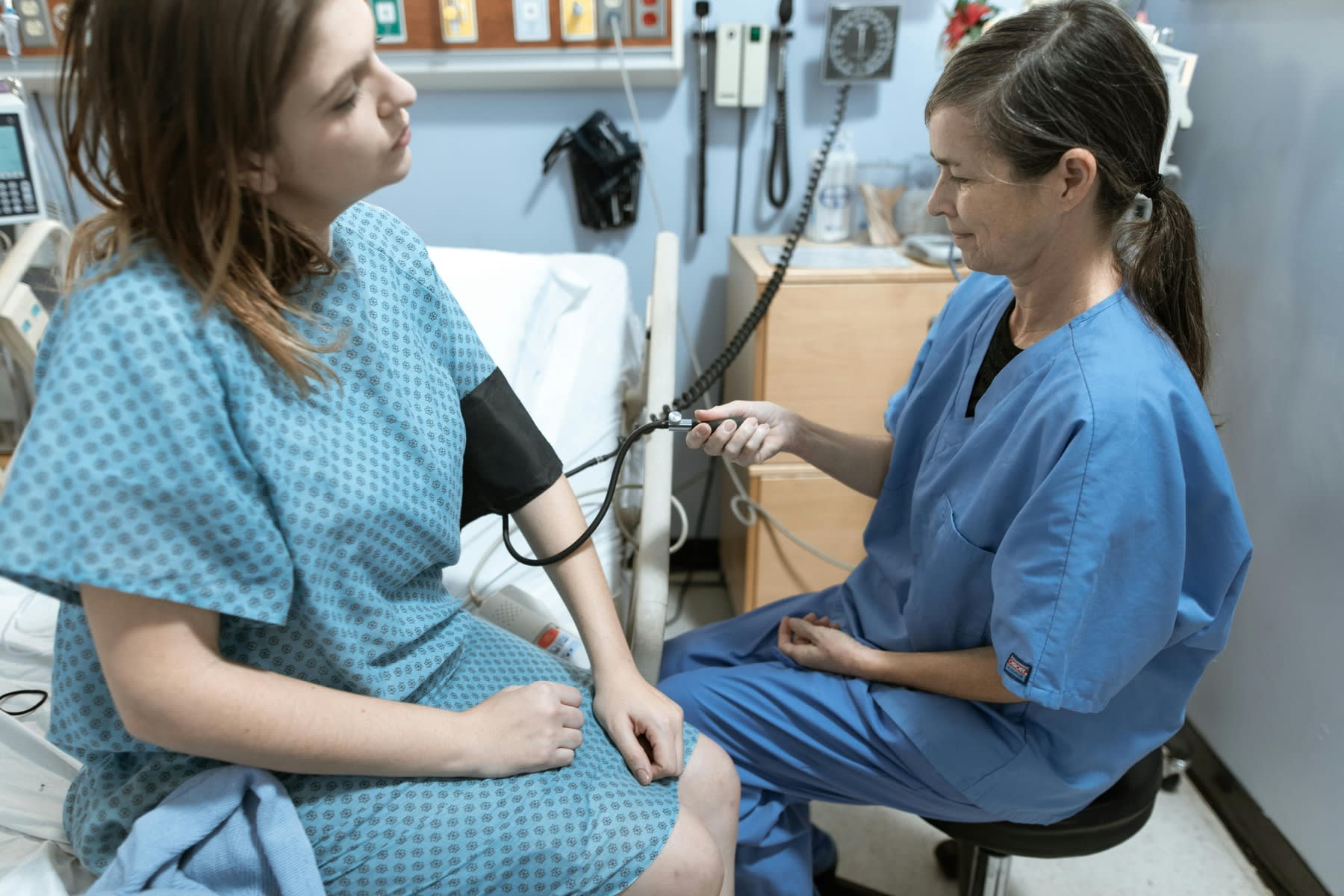How Long Does It Take to Get a BSN Degree?

Key Takeaways
- A traditional BSN degree takes approximately 4 years to complete.
- An accelerated BSN degree program takes approximately 12-20 months to complete.
- An RN to BSN degree program can be completed in approximately 1-2 years.
Considering the nature and weight of this degree, most prospective students wonder, “How long does it take to get a BSN degree?“. While the timeline differs based on your program choice, in this article, we will walk you through the different types of BSN programs and their lengths.
Featured Programs
How Long Does It Take To Get a BSN Degree?
The time required to obtain a Bachelor of Science in Nursing (BSN) varies based on the chosen educational path. There are traditional BSN programs and accelerated options for those with a prior bachelor’s degree, as well as RN-to-BSN programs for registered nurses.
| BSN Degree Type | Description | Time to Complete (Full-Time) |
|---|---|---|
| Traditional BSN | This is the most common BSN program designed for students entering with no prior nursing experience. | 4 years |
| Accelerated BSN (ABSN) | This program is designed for individuals with a bachelor’s degree in another field. It offers a faster track to a BSN by focusing on core nursing coursework and minimizing or eliminating general education requirements. | 12 - 20 months |
| RN to BSN | This program allows registered nurses (RNs) with an associate’s degree in nursing (ADN) to earn their BSN. It typically focuses on upper-division nursing courses and may incorporate some general education credits. | 1 - 2 years (depending on program structure and transfer credits) |

Traditional BSN Programs
A traditional BSN program is the standard option for individuals entering the nursing field. The duration of these full-time programs is typically four years.
The curriculum of traditional BSN degrees includes:
- General education courses, providing foundational knowledge in sciences and humanities
- Core nursing courses, offering in-depth nursing theory and practice
- Clinical experiences, delivering hands-on training in healthcare settings
Accelerated BSN Programs
Accelerated BSN programs cater to individuals who already hold a bachelor’s degree in a non-nursing discipline. These intensive and fast-paced programs usually span 12 to 18 months. Eligibility criteria and program highlights include:
- A non-nursing bachelor’s degree is required
- Completion of specific science and health-related courses
- Concentration on core nursing education
- Immersive, hands-on practice
RN-To-BSN Programs
RN-to-BSN programs are ideal for registered nurses with a prior associate degree in nursing (ADN).
The RN-to-BSN programs offer:
- Career advancement opportunities, which opens doors for higher-level nursing positions.
- Increased job prospects
The program length is flexible and can vary from a few months to two years. It depends on:
- Credit transfer options, such as the acceptance of prior college credits
- Program structure, which typically includes online coursework
- Focus on expanding existing nursing skills and knowledge
What Factors Affect the Completion Time of a BSN Degree?
Several factors can influence the time it takes to complete a BSN degree. These factors range from the volume of coursework to the balancing act between professional life and educational commitments.
Course Load
The duration of a BSN program is significantly affected by the course load a student opts to take each semester. A typical full-time student may complete the degree in 4 years, while part-time students will likely take longer, depending on the number of credits they enroll in per term.
Transfer Credits
Students who have earned college credits previously may be eligible to transfer these toward their BSN. This can drastically reduce the number of required courses, thereby shortening the time needed to graduate. Schools often have policies detailing which credits are transferable.
Personal Circumstances
Personal obligations, such as employment, caring for family, or other responsibilities, can limit students’ time to study. If you face this, you may need a lighter course load; however, it increases the timeframe for completing the degree.
Clinical Requirements
Clinical rotations are supervised by accrediting organizations and state nursing boards, which mandate the number and type of hours. Clinical site and schedule compatibility also play a vital role in determining when students can complete their clinical requirements and, consequently, their degree.

Back to Top
What does a BSN degree typically involve?
A BSN degree provides comprehensive education and training for individuals aiming to become registered nurses. This program includes theoretical coursework and practical clinical experience, equipping graduates with the necessary skills to excel in healthcare.
Foundation Courses
A BSN program lays a strong groundwork in general education. Students receive instruction in core subjects such as math, science, and humanities. These disciplines are integral for fostering critical thinking and enhancing communication abilities important for nursing professionals.
Nursing-Specific Knowledge
The program dives into nursing-centric courses that cover key areas, including anatomy, physiology, pharmacology, and nursing theory. This in-depth study assures that students understand the complexities and responsibilities of patient care and medical treatment.
Clinical Experience
Clinical rotations are an important part of a BSN curriculum. These rotations offer hands-on practice in a variety of healthcare settings. This exposure is vital for students to apply their knowledge and refine their nursing skills in real-world situations.
Back to TopBenefits of a BSN
A BSN degree not only enhances professional qualifications, it also offers various advantages to students looking to enter the nursing field.
Career Opportunities
A BSN degree holder benefits from various career opportunities within the nursing sector. In comparison to those with an associate’s degree in nursing, a BSN graduate often has access to specialized nursing roles and leadership positions. The demand for nurses is high, with nearly 195,000 job openings for registered nurses expected each year.
Salary Potential
Nurses with a BSN degree report a higher earning potential than their counterparts with an ADN. Data shows that ADN-holding nurses earn an annual average of $75,776. On the other hand, BSN-qualified nurses generally have access to more competitive and rewarding positions, especially as they ascend the career ladder.
Skills And Knowledge
The BSN curriculum is designed to develop a nurse’s ability to act swiftly, solve problems, and lead effectively. Nursing students enrolled in BSN programs receive extensive training that covers technical knowledge in human anatomy and sharpens interpersonal skills like patient communication.

Back to Top
Career Opportunities for a BSN Degree Holder
A BSN degree opens many career paths in diverse healthcare settings. Nurses with a BSN qualification can expect to find opportunities in direct patient care, leadership and management roles, public health, and educational and research settings.
Direct Patient Care
- Hospitals: Nurses with a BSN degree can go for various roles in hospital settings, such as providing specialized care in acute care, critical care, emergency departments, pediatrics, maternity, labor, and delivery, as well as in operating rooms and oncology departments.
- Ambulatory care clinics: These clinics offer opportunities for BSN nurses in areas such as family practice, internal medicine, pediatrics, urgent care, and specialty clinics, including cardiology and oncology.
- Home healthcare agencies: BSN-prepared nurses serve in roles where they provide care to patients in their homes, helping them recover from an illness or surgery or manage chronic conditions.
- Long-term care facilities: Responsibilities at these facilities include caring for the elderly or disabled residents in environments like nursing homes or assisted living centers.
- School nursing: A school nurse’s role involves delivering healthcare services in educational institutions and promoting student well-being.
Leadership And Management
- Nurse manager or charge nurse: These nurses oversee patient care within a unit, delegate tasks effectively, and maintain quality standards.
- Nurse educators: They play a critical role in guiding and supporting newly graduated nurses as they transition into their first roles within the healthcare sector.
- Unit-based leader: BSN nurses may participate in decision-making processes, contribute to quality improvement initiatives, and advocate for patient care needs within healthcare units.
- Case management: These professionals coordinate comprehensive patient care plans, ensuring seamless care across various healthcare settings.
Public Health And Community Health
- Public health departments: BSN nurses working in the public health sector focus on preventative care, developing health education programs, and encouraging healthy lifestyle choices in the wider community.
- Community health clinics: In these clinics, nurses provide important primary care services to underserved populations.
- Occupational health nursing: In this area, nurses educate employees on safety practices and monitor their health in workplace environments.
Research and Education
- Research nurse: Nurses in this role assist with the development and execution of clinical research studies to advance medical knowledge and improve patient outcomes.
- Nursing instructor: Nursing instructors contribute significantly to the profession by educating the next generation of nurses within academic settings. Their role includes teaching various nursing subjects and leading clinical training.
Best Universities Offering BSN Degree Programs
Earning a BSN is a significant step towards a fulfilling healthcare career. However, choosing the right nursing university for a good educational experience and future career opportunities is important.
Let’s look at the top three universities in the USA offering BSN programs.
| University/College | Location | Type of University | Tuition (USD) |
|---|---|---|---|
| University of Pennsylvania | Philadelphia, PA | Private | $58,620 |
| University of California, Los Angeles (UCLA) | Los Angeles, CA | Public | $42,127 |
| Duke University | Durham, NC | Private | $26,369 |
- #5 Top Schools that Offer Free Master's Degrees Online #10 50 Best Private Grad Schools 2025 #10 50 Best Private Colleges and Universities for Undergrads 2025 #10 50 Best Research Universities Ranked for Undergrads in 2024
Tuition + fees
$63K
Acceptance
7%
Graduation
96%
Student body
33K
Median SAT/ACT
1535/34
Career Outlook for Nursing degree at University of Pennsylvania
Cost of Degree: $66,104Expenses: $22,924Starting Salary: $197,151Cost Recoup Time: 13 yearsPaid back at 15% of annual salary- Known for: Prestigious public university with a well-respected BSN program. Offers a strong focus on clinical experiences and preparing nurses for diverse healthcare settings.
- Duration: Four years
- Tuition: $58,620
- Ranking: 12
The University of Pennsylvania School of Nursing is globally known for its rigorous curriculum and unwavering commitment to research excellence. Their bachelor of science in nursing program prepares graduates for success in various healthcare settings, emphasizing critical thinking, clinical expertise, and leadership skills.
The traditional BSN program lasts four years and provides a comprehensive foundation in nursing science and practice. Additionally, the School of Nursing offers an accelerated program for individuals with bachelor’s degrees in another field.
While the University of Pennsylvania is a private institution with high tuition, it offers scholarships and financial aid options to help students manage the cost of obtaining a nursing bachelors degree.
- #3 50 Best Public Colleges and Universities Ranked for Students in 2025 #3 50 Best Public Grad Schools 2025 #3 Best Value Colleges and Universities Ranked for Students in 2025 #7 America's 15 Most Technologically Advanced Colleges
Tuition + fees
$13K
Acceptance
9%
Graduation
92%
Student body
49K
Career Outlook for Nursing degree at University of California, Los Angeles
Cost of Degree: $13,747Expenses: $24,284Starting Salary: $117,813Cost Recoup Time: 11 yearsPaid back at 15% of annual salary- Known for: Prestigious public university with a well-respected BSN program. Offers a strong focus on clinical experiences and preparing nurses for diverse healthcare settings.
- Duration: Four years
- Tuition: $42,127
- Ranking: 29
Nestled in the vibrant city of Los Angeles, UCLA School of Nursing offers a prestigious public university experience with a well-respected BSN program. Their curriculum emphasizes hands-on clinical experiences, preparing graduates to work confidently in diverse healthcare settings.
Students gain valuable experience through partnerships with leading hospitals and clinics throughout Los Angeles County. As a public university, UCLA offers more affordable tuition than private institutions, although costs may vary depending on residency status.
UCLA School of Nursing is an excellent option for students seeking a well-rounded BSN education with a strong focus on clinical practice.
- #1 Best Online Christian Colleges and Universities for Doctoral Degrees 2026 #1 50 Best Christian Colleges and Universities 2024 #6 Top Schools that Offer Free Master's Degrees Online #13 50 Best Private Grad Schools 2025
Tuition + fees
$63K
Acceptance
6%
Graduation
97%
Student body
18K
Median SAT/ACT
1530/34
Career Outlook for Nursing degree at Duke University
Cost of Degree: $65,805Expenses: $21,267Starting Salary: $171,533Cost Recoup Time: 14 yearsPaid back at 15% of annual salary- Known for: Renowned private university offering a top-ranked ABSN program with a strong research focus. Also offers an accelerated BSN program for those with a prior bachelor’s degree.
- Duration: Four years to 16 months
- Tuition: $26,369
- Ranking: 57
Duke University School of Nursing is a renowned private university that offers a top-ranked accelerated BSN program with a strong research focus. Their curriculum focuses on the scientific underpinnings of nursing practice, preparing graduates for careers in patient care, leadership, or research.
Notably, Duke offers an accelerated BSN program for those with a prior bachelor’s degree, allowing them to transition into nursing in a shorter time frame. While tuition is high at Duke, scholarships and financial aid are available to assist deserving students. Duke University School of Nursing is a great choice for students seeking a research-intensive program at a prestigious institution.

Related Questions
How much does a BSN program cost?
The cost of a BSN program can vary widely, ranging from $40,000 to over $100,000. Public institutions often offer lower tuition rates than private ones, and additional expenses may include lab fees, books, and supplies.
What is the shortest time to get a nursing degree?
The shortest path to a nursing degree is through accelerated BSN programs, which can be completed in 12 to 18 months for those who already hold a bachelor’s degree in another field. For those starting from scratch, associate degree in nursing (ADN) programs can be completed in about 2 years.
What is the difference between ADN and BSN?
A BSN program typically offers a more comprehensive curriculum that includes leadership, research, and public health, potentially leading to higher salaries and more opportunities for advancement. In contrast, ADN programs focus on basic nursing competencies and can be completed more quickly.
Conclusion
BSN programs are designed to be completed in four years of full-time study. Accelerated programs can be completed in less time, typically 12-18 months. Part-time students may take longer to complete their degrees. Being aware of the completion time is vital for nursing students to plan their education and career paths efficiently.